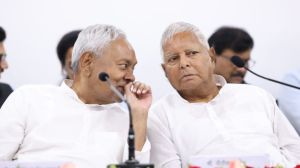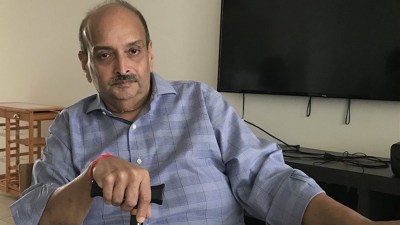Delhi HC upholds money laundering probe against businessmen Sathish Babu Sana, Pradeep Koneru
The Enforcement Directorate has initiated money laundering proceedings against Sathish Babu Sana and Pradeep Koneru in a case allegedly involving meat exporter Moin Qureshi.
 Noting the Supreme Court’s 2022 decision in Vijay Madanlal Choudhary v UOI and the fact that the petitioners were “involved in the case of money laundering”, the bench found that the proceedings under the Prevention of Money Laundering Act (PMLA) had been rightly initiated against them. (Express File)
Noting the Supreme Court’s 2022 decision in Vijay Madanlal Choudhary v UOI and the fact that the petitioners were “involved in the case of money laundering”, the bench found that the proceedings under the Prevention of Money Laundering Act (PMLA) had been rightly initiated against them. (Express File)The Delhi High Court on Friday upheld the Enforcement Directorate’s (ED’s) money laundering proceedings against businessmen Sathish Babu Sana and Pradeep Koneru in a case allegedly involving them and meat exporter Moin Qureshi.
A division bench of Justice Suresh Kumar Kait and Justice Neena Bansal Krishna further refused to quash the summonses issued to them by the ED and said their summoning was “just and proper to unearth the roots of the money trail”. The high court, which had granted interim protection to Sana and Koneru in 2019, said it would continue for two weeks.
The bench further said, “Relevantly, the Hon’ble Supreme Court in its decision dated 31.05.2023…titled as Vijay Bhatia Vs. Union of India & Ors. has deprecated the practice of filing writ petitions challenging the validity of Section 50 of the Act despite its decision in Vijay Madanlal Choudhary (Supra).”
Noting the Supreme Court’s 2022 decision in Vijay Madanlal Choudhary v UOI and the fact that the petitioners were “involved in the case of money laundering”, the bench found that the proceedings under the Prevention of Money Laundering Act (PMLA) had been rightly initiated against them.
“Finding no merit in the averments raised by the petitioners, these petitions and pending applications are accordingly dismissed,” the bench said.
The ED had carried out an investigation against Qureshi pointing to allegations of him “procuring undue relief against illegal favours by obtaining huge amounts of money” for the work done which was taken in the name of government servants/politicians.
The Central Bureau of Investigation (CBI) had also registered a case under the Prevention of Corruption Act and the Indian Penal Code for allegedly hatching a criminal conspiracy and taking illegal money to influence a public servant, among other provisions, against Qureshi, Koneru and other unknown persons.
Sana had approached the high court seeking to declare Section 50(2) of the PMLA as unconstitutional and ultra vires of Section 132 of the Indian Evidence Act and Articles 14, 20 (3) and 21 of the Constitution of India, in case of a witness to a case. He had sought a declaration that Section 50(2) of PMLA shall not apply to any person who has been arrayed and shown as a witness in a complaint. He had sought quashing of the two summons issued to him in 2019.
As per Section 50(2) the director, additional director, joint director, deputy director or assistant director (of the ED) shall have the power to summon any person whose attendance he considers necessary whether to give evidence or to produce any records during the course of any investigation or proceeding under the PMLA.
Koneru had also challenged the constitutionality of Section 50(2) PMLA and sought the quashing of the CBI FIR.
The high court noted that the petitioners were arrayed as witnesses in the CBI case, however, during the investigation, a case under the PMLA was registered wherein “they have been arrayed as accused”.
“The ratio of law laid down by the Hon’ble Supreme Court in Vijay Madanlal (Supra), clearly spells out that it may happen in cases that a person who is witness in offences related to scheduled offences, during his interrogation, may put forth some material which would indicate his involvement in the commission of offence under PMLA. This court in a catena of decisions has already held that proceedings under the scheduled offences and PMLA are separate and distinct and have no binding upon each other,” the bench said.
It further noted that Sana, in his statements recorded under Section 50 of the PMLA, “had been changing his stand”.
The high court noted that during the course of investigation by the ED, Sana and Koneru in their respective statements recorded under Section 50 of PMLA admitted to having paid “crores of rupees” to Qureshi through his employee Aditya Sharma for obtaining “illegal favour from the government servants after using his influence”.
It further said, “Aditya Sharma was also confronted with the facts and evidence on record, who confirmed the monetary transactions received by him. The same was also found in tandem with the contents of BBM (Blackberry messenger) messages retrieved by forensics lab, CERT-In. These amounts were found to be sent for hawala transactions through Delhi based hawala operators which reflected in the BBM messages of Aditya Sharma and ex CBI Director AP Singh.”
The bench noted that the investigation had revealed the alleged involvement of Sana in acquisition of proceeds of crime by Qureshi and that he had paid huge amounts to him to influence the public servants.
It thereafter said that both Sana and Koneru, had “prima facie committed offence of money laundering” as defined in Section 3 PMLA by “directly or indirectly indulging in, knowingly assisting, knowingly a party and actually involved in all or any process or activity connected with the proceeds of crime including its concealment, possession, acquisition or use and projecting or claiming it as untainted property”.







